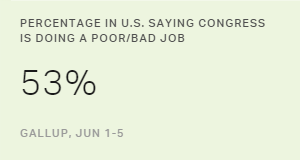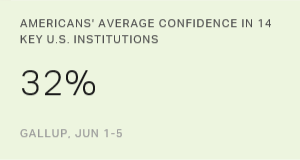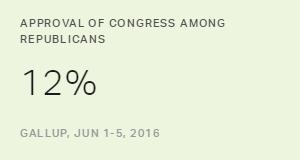Story Highlights
- 56% of critics strongly agree Congress too beholden to financial contributors
- Also agree strongly that Congress pays too much attention to lobbyists
- Most frequent general complaint about Congress: partisan gridlock
PRINCETON, N.J. -- Congress' harshest critics -- -- feel more strongly about the undue influence that donors and lobbyists have on Congress than they do about any other major criticism of the institution. More than half of this group strongly agrees that members of Congress pay too much attention to what their contributors want them to do (56%) and what special interests and lobbyists want them to do (55%). Nearly half (46%) strongly agree that members of Congress should be willing to compromise more.
| Rate Congress' Job Poor or Bad (53%) | Rate Congress' Job Excellent, Good or Fair (45%) | ||||||||||||||||||||||||||||||||||||||||||||||||||||||||||||||||||||||||||||||||||||||||||||||||||
|---|---|---|---|---|---|---|---|---|---|---|---|---|---|---|---|---|---|---|---|---|---|---|---|---|---|---|---|---|---|---|---|---|---|---|---|---|---|---|---|---|---|---|---|---|---|---|---|---|---|---|---|---|---|---|---|---|---|---|---|---|---|---|---|---|---|---|---|---|---|---|---|---|---|---|---|---|---|---|---|---|---|---|---|---|---|---|---|---|---|---|---|---|---|---|---|---|---|---|---|
| % | % | ||||||||||||||||||||||||||||||||||||||||||||||||||||||||||||||||||||||||||||||||||||||||||||||||||
| Pay too much attention to financial contributors | 56 | 23 | |||||||||||||||||||||||||||||||||||||||||||||||||||||||||||||||||||||||||||||||||||||||||||||||||
| Pay too much attention to special interests and lobbyists | 55 | 23 | |||||||||||||||||||||||||||||||||||||||||||||||||||||||||||||||||||||||||||||||||||||||||||||||||
| Should be willing to compromise more | 46 | 31 | |||||||||||||||||||||||||||||||||||||||||||||||||||||||||||||||||||||||||||||||||||||||||||||||||
| Spend too much time campaigning and raising money | 43 | 19 | |||||||||||||||||||||||||||||||||||||||||||||||||||||||||||||||||||||||||||||||||||||||||||||||||
| Pay too much attention to party leaders | 32 | 18 | |||||||||||||||||||||||||||||||||||||||||||||||||||||||||||||||||||||||||||||||||||||||||||||||||
| Congress not getting lots of important work accomplished | 39 | 7 | |||||||||||||||||||||||||||||||||||||||||||||||||||||||||||||||||||||||||||||||||||||||||||||||||
| Congress has not worked hard to address issues you care most deeply about | 37 | 8 | |||||||||||||||||||||||||||||||||||||||||||||||||||||||||||||||||||||||||||||||||||||||||||||||||
| Mainly out to gain personal glory and success | 30 | 15 | |||||||||||||||||||||||||||||||||||||||||||||||||||||||||||||||||||||||||||||||||||||||||||||||||
| Mainly out to get rich | 25 | 14 | |||||||||||||||||||||||||||||||||||||||||||||||||||||||||||||||||||||||||||||||||||||||||||||||||
| Are not honest | 27 | 8 | |||||||||||||||||||||||||||||||||||||||||||||||||||||||||||||||||||||||||||||||||||||||||||||||||
| Congress has passed legislation you strongly object to | 25 | 11 | |||||||||||||||||||||||||||||||||||||||||||||||||||||||||||||||||||||||||||||||||||||||||||||||||
| Do not care a lot about what their constituents want them to do | 21 | 5 | |||||||||||||||||||||||||||||||||||||||||||||||||||||||||||||||||||||||||||||||||||||||||||||||||
| American public would be better off if Congress did less | 14 | 8 | |||||||||||||||||||||||||||||||||||||||||||||||||||||||||||||||||||||||||||||||||||||||||||||||||
| Are not smart enough for their job | 14 | 3 | |||||||||||||||||||||||||||||||||||||||||||||||||||||||||||||||||||||||||||||||||||||||||||||||||
| Based on agreement with negative statements or disagreement with positive statements about Congress | |||||||||||||||||||||||||||||||||||||||||||||||||||||||||||||||||||||||||||||||||||||||||||||||||||
| Â鶹´«Ã½AV | |||||||||||||||||||||||||||||||||||||||||||||||||||||||||||||||||||||||||||||||||||||||||||||||||||
By contrast, 4% of those most critical of Congress say its members care a lot about what their own constituents want them to do; 21% strongly disagree with this statement.
These results are part of a special Â鶹´«Ã½AV analysis of the reasons behind Americans' extraordinarily low regard for Congress. Just rate the job Congress is doing as excellent or good, and Congress' is at 16%.
In a June 1-5 survey, Â鶹´«Ã½AV asked Americans to react to a series of 14 positive and negative statements about Congress that encompass the major concerns that previous Â鶹´«Ã½AV research shows most bothers Americans about the institution. The responses among Americans who are most critical of Congress, as well as those whose views of Congress are either positive or neutral, are shown in the accompanying table. As would be expected, those who rate the job Congress is doing as poor or bad are much more likely than others to judge Congress negatively across the 14 dimensions.
The views of the majority of Americans who say Congress is doing a poor or bad job may be particularly helpful in revealing the institution's core image problem. Additionally, those who are most critical of Congress are about Congress, according to their answers to several factual questions about how Congress operates, underscoring the value of understanding what this group thinks.
The only two statements that a majority of those most critical of Congress strongly agree with are that Congress pays too much attention to financial contributors and too much attention to lobbyists and special interests. The related concern that members of Congress spend too much time raising money also ranks highly, with 43% strongly agreeing.
Notably, despite the 46% strongly agreeing that Congress should be willing to compromise more, only 32% of those most critical of Congress strongly agree that members pay too much attention to what their party leaders want them to do. Americans most critical of Congress thus apparently see partisanship, at least as it plays out in party leaders telling members what to do, taking a backseat to the influence of special interests in creating gridlock in Washington.
Americans who view Congress as doing an excellent, good or fair job are not nearly as likely to strongly agree with critical statements about Congress, but a substantial percentage still agree, even if not strongly. Among this group, lack of congressional compromise ranks first on the "strongly agree" list, with others falling behind. The complete results for this and other groups are reported at the end of this article.
Congressional Inaction Leads Top-of-Mind Concerns
A somewhat different perspective on Congress' image problem emerges from Americans' answers to an open-ended question about why they rate Congress the way they do. Almost half of Americans who say Congress is doing a poor or bad job cite congressional inaction or gridlock as the top reason for their view. This is consistent with the reasons when asked open-ended questions about their views of Congress.
Relatively few in this group of critics spontaneously think of outside influences on Congress, such as lobbyists or financial contributors, even though these concerns spark relatively high levels of agreement when they are asked about specifically.
Thus, lack of compromise emerges as a leading concern about Congress in both the agree/disagree measure of what's wrong with Congress and the open-ended format. What is different about the results of the two approaches is that few Americans who are critical of Congress mention special interests or lobbyists in response to the open-ended question. This seeming disparity may indicate that Americans distinguish between what they believe Congress is doing wrong and the factors behind that failure. The open-ended questions reveal that Congress' lack of action on the nation's problems is the ultimate problem. At the same time, Americans' responses to the agree/disagree statements apparently tap into an underlying belief that special interests and big donors are thwarting the nation's business more generally.
| Rate Congress Poor/Bad | Rate Congress Excellent/Good | Total | |||||||||||||||||||||||||||||||||||||||||||||||||||||||||||||||||||||||||||||||||||||||||||||||||
|---|---|---|---|---|---|---|---|---|---|---|---|---|---|---|---|---|---|---|---|---|---|---|---|---|---|---|---|---|---|---|---|---|---|---|---|---|---|---|---|---|---|---|---|---|---|---|---|---|---|---|---|---|---|---|---|---|---|---|---|---|---|---|---|---|---|---|---|---|---|---|---|---|---|---|---|---|---|---|---|---|---|---|---|---|---|---|---|---|---|---|---|---|---|---|---|---|---|---|---|
| % | % | % | |||||||||||||||||||||||||||||||||||||||||||||||||||||||||||||||||||||||||||||||||||||||||||||||||
| Party gridlock/obstruction | 27 | 10 | 20 | ||||||||||||||||||||||||||||||||||||||||||||||||||||||||||||||||||||||||||||||||||||||||||||||||
| Needs to accomplish what they promised/address the issues/take action | 22 | 18 | 20 | ||||||||||||||||||||||||||||||||||||||||||||||||||||||||||||||||||||||||||||||||||||||||||||||||
| Represent party more than the people | 9 | 5 | 7 | ||||||||||||||||||||||||||||||||||||||||||||||||||||||||||||||||||||||||||||||||||||||||||||||||
| Too much personal interest | 9 | 2 | 6 | ||||||||||||||||||||||||||||||||||||||||||||||||||||||||||||||||||||||||||||||||||||||||||||||||
| Republicans opposing President Obama | 7 | 5 | 6 | ||||||||||||||||||||||||||||||||||||||||||||||||||||||||||||||||||||||||||||||||||||||||||||||||
| Not doing a good job (nonspecific) | 4 | 2 | 3 | ||||||||||||||||||||||||||||||||||||||||||||||||||||||||||||||||||||||||||||||||||||||||||||||||
| Corruption | 3 | 0 | 2 | ||||||||||||||||||||||||||||||||||||||||||||||||||||||||||||||||||||||||||||||||||||||||||||||||
| Spending too much money/increasing the deficit | 3 | 1 | 2 | ||||||||||||||||||||||||||||||||||||||||||||||||||||||||||||||||||||||||||||||||||||||||||||||||
| Lobbyists/special interests have too much influence on what Congress does | 2 | 1 | 2 | ||||||||||||||||||||||||||||||||||||||||||||||||||||||||||||||||||||||||||||||||||||||||||||||||
| Are bipartisan/are compromising | 2 | 3 | 2 | ||||||||||||||||||||||||||||||||||||||||||||||||||||||||||||||||||||||||||||||||||||||||||||||||
| Need term limits | 2 | 1 | 1 | ||||||||||||||||||||||||||||||||||||||||||||||||||||||||||||||||||||||||||||||||||||||||||||||||
| Should pay better attention/be more focused | 2 | 0 | 1 | ||||||||||||||||||||||||||||||||||||||||||||||||||||||||||||||||||||||||||||||||||||||||||||||||
| Should be more accountable | 2 | 0 | 1 | ||||||||||||||||||||||||||||||||||||||||||||||||||||||||||||||||||||||||||||||||||||||||||||||||
| Lying | 1 | 0 | 1 | ||||||||||||||||||||||||||||||||||||||||||||||||||||||||||||||||||||||||||||||||||||||||||||||||
| Doing a good job (nonspecific) | 0 | 18 | 9 | ||||||||||||||||||||||||||||||||||||||||||||||||||||||||||||||||||||||||||||||||||||||||||||||||
| Some action being taken, need to take more | 0 | 8 | 4 | ||||||||||||||||||||||||||||||||||||||||||||||||||||||||||||||||||||||||||||||||||||||||||||||||
| Other | 2 | 2 | 2 | ||||||||||||||||||||||||||||||||||||||||||||||||||||||||||||||||||||||||||||||||||||||||||||||||
| No opinion | 3 | 24 | 12 | ||||||||||||||||||||||||||||||||||||||||||||||||||||||||||||||||||||||||||||||||||||||||||||||||
| Â鶹´«Ã½AV | |||||||||||||||||||||||||||||||||||||||||||||||||||||||||||||||||||||||||||||||||||||||||||||||||||
Bottom Line
The explanations for Americans' low ratings of Congress as a whole appear to coalesce into two broad categories. First is Americans' belief that Congress is not accomplishing enough and suffers from gridlock. Second, and related to the first, is their belief that Congress is under the control of outside influences, including those with money and lobbyists, and is less interested in the interests of their constituents. These are also the primary factors explaining the particularly negative view of Congress' harshest critics.
Congress' failure to act on in 2007 or within the required time frame in 2013 are two of the more spectacular historical examples of legislative intransigence undermining public confidence in the institution. The inability of Congress to take action on gun control this week, despite much evidence that the public supports increases in background checks and , is a recent illustration of the public's chief complaints.
Â鶹´«Ã½AV Senior Scientist Michael W. Traugott, Ph.D., contributed to this article.
Survey Methods
Results for this Â鶹´«Ã½AV poll are based on telephone interviews conducted June 1-5, 2016, with a random sample of 1,027 adults, aged 18 and older, living in all 50 U.S. states and the District of Columbia. For results based on the total sample of national adults, the margin of sampling error is ±4 percentage points at the 95% confidence level. All reported margins of sampling error include computed design effects for weighting.
Each sample of national adults includes a minimum quota of 60% cellphone respondents and 40% landline respondents, with additional minimum quotas by time zone within region. Landline and cellular telephone numbers are selected using random-digit-dial methods.
View complete question responses and trends.
Learn more about how the works.
| Strongly agree | Agree | Neither | Disagree | Strongly disagree | |||||||||||||||||||||||||||||||||||||||||||||||||||||||||||||||||||||||||||||||||||||||||||||||
|---|---|---|---|---|---|---|---|---|---|---|---|---|---|---|---|---|---|---|---|---|---|---|---|---|---|---|---|---|---|---|---|---|---|---|---|---|---|---|---|---|---|---|---|---|---|---|---|---|---|---|---|---|---|---|---|---|---|---|---|---|---|---|---|---|---|---|---|---|---|---|---|---|---|---|---|---|---|---|---|---|---|---|---|---|---|---|---|---|---|---|---|---|---|---|---|---|---|---|---|
| % | % | % | % | % | |||||||||||||||||||||||||||||||||||||||||||||||||||||||||||||||||||||||||||||||||||||||||||||||
| Pay too much attention to financial contributors | 56 | 38 | 2 | 3 | 1 | ||||||||||||||||||||||||||||||||||||||||||||||||||||||||||||||||||||||||||||||||||||||||||||||
| Pay too much attention to special interests and lobbyists | 55 | 37 | 2 | 4 | 2 | ||||||||||||||||||||||||||||||||||||||||||||||||||||||||||||||||||||||||||||||||||||||||||||||
| Should be willing to compromise more | 46 | 41 | 3 | 7 | 2 | ||||||||||||||||||||||||||||||||||||||||||||||||||||||||||||||||||||||||||||||||||||||||||||||
| Spend too much time campaigning and raising money | 43 | 42 | 7 | 7 | 0 | ||||||||||||||||||||||||||||||||||||||||||||||||||||||||||||||||||||||||||||||||||||||||||||||
| Congress getting lots of important work accomplished | 1 | 3 | 4 | 51 | 39 | ||||||||||||||||||||||||||||||||||||||||||||||||||||||||||||||||||||||||||||||||||||||||||||||
| Congress has worked hard to address issues you care most about | 1 | 6 | 4 | 52 | 36 | ||||||||||||||||||||||||||||||||||||||||||||||||||||||||||||||||||||||||||||||||||||||||||||||
| Pay too much attention to party leaders | 32 | 52 | 6 | 8 | 2 | ||||||||||||||||||||||||||||||||||||||||||||||||||||||||||||||||||||||||||||||||||||||||||||||
| Mainly out to gain personal glory and success | 30 | 46 | 10 | 13 | 1 | ||||||||||||||||||||||||||||||||||||||||||||||||||||||||||||||||||||||||||||||||||||||||||||||
| Are honest | 1 | 7 | 13 | 51 | 27 | ||||||||||||||||||||||||||||||||||||||||||||||||||||||||||||||||||||||||||||||||||||||||||||||
| Mainly out to get rich | 25 | 40 | 13 | 19 | 1 | ||||||||||||||||||||||||||||||||||||||||||||||||||||||||||||||||||||||||||||||||||||||||||||||
| Congress has passed legislation you strongly object to | 25 | 41 | 13 | 14 | 4 | ||||||||||||||||||||||||||||||||||||||||||||||||||||||||||||||||||||||||||||||||||||||||||||||
| Care a lot about what their constituents want them to do | 4 | 23 | 10 | 41 | 21 | ||||||||||||||||||||||||||||||||||||||||||||||||||||||||||||||||||||||||||||||||||||||||||||||
| American public would be better off if Congress did less | 14 | 28 | 10 | 35 | 13 | ||||||||||||||||||||||||||||||||||||||||||||||||||||||||||||||||||||||||||||||||||||||||||||||
| Smart enough for their job | 3 | 35 | 14 | 32 | 14 | ||||||||||||||||||||||||||||||||||||||||||||||||||||||||||||||||||||||||||||||||||||||||||||||
| June 1-5, 2016 | |||||||||||||||||||||||||||||||||||||||||||||||||||||||||||||||||||||||||||||||||||||||||||||||||||
| Strongly agree | Agree | Neither | Disagree | Strongly disagree | |||||||||||||||||||||||||||||||||||||||||||||||||||||||||||||||||||||||||||||||||||||||||||||||
|---|---|---|---|---|---|---|---|---|---|---|---|---|---|---|---|---|---|---|---|---|---|---|---|---|---|---|---|---|---|---|---|---|---|---|---|---|---|---|---|---|---|---|---|---|---|---|---|---|---|---|---|---|---|---|---|---|---|---|---|---|---|---|---|---|---|---|---|---|---|---|---|---|---|---|---|---|---|---|---|---|---|---|---|---|---|---|---|---|---|---|---|---|---|---|---|---|---|---|---|
| % | % | % | % | % | |||||||||||||||||||||||||||||||||||||||||||||||||||||||||||||||||||||||||||||||||||||||||||||||
| Should be willing to compromise more | 31 | 56 | 5 | 6 | 2 | ||||||||||||||||||||||||||||||||||||||||||||||||||||||||||||||||||||||||||||||||||||||||||||||
| Pay too much attention to special interests and lobbyists | 23 | 52 | 9 | 13 | 2 | ||||||||||||||||||||||||||||||||||||||||||||||||||||||||||||||||||||||||||||||||||||||||||||||
| Pay too much attention to financial contributors | 23 | 55 | 8 | 11 | 2 | ||||||||||||||||||||||||||||||||||||||||||||||||||||||||||||||||||||||||||||||||||||||||||||||
| Spend too much time campaigning and raising money | 19 | 44 | 11 | 23 | 1 | ||||||||||||||||||||||||||||||||||||||||||||||||||||||||||||||||||||||||||||||||||||||||||||||
| Pay too much attention to party leaders | 18 | 56 | 11 | 12 | 2 | ||||||||||||||||||||||||||||||||||||||||||||||||||||||||||||||||||||||||||||||||||||||||||||||
| Mainly out to gain personal glory and success | 15 | 42 | 16 | 26 | 1 | ||||||||||||||||||||||||||||||||||||||||||||||||||||||||||||||||||||||||||||||||||||||||||||||
| Mainly out to get rich | 14 | 34 | 18 | 32 | 2 | ||||||||||||||||||||||||||||||||||||||||||||||||||||||||||||||||||||||||||||||||||||||||||||||
| Congress has passed legislation you strongly object to | 11 | 40 | 17 | 26 | 4 | ||||||||||||||||||||||||||||||||||||||||||||||||||||||||||||||||||||||||||||||||||||||||||||||
| American public would be better off if Congress did less | 8 | 31 | 15 | 36 | 8 | ||||||||||||||||||||||||||||||||||||||||||||||||||||||||||||||||||||||||||||||||||||||||||||||
| Smart enough for their job | 8 | 49 | 20 | 19 | 3 | ||||||||||||||||||||||||||||||||||||||||||||||||||||||||||||||||||||||||||||||||||||||||||||||
| Care a lot about what their constituents want them to do | 10 | 42 | 15 | 27 | 5 | ||||||||||||||||||||||||||||||||||||||||||||||||||||||||||||||||||||||||||||||||||||||||||||||
| Congress getting lots of important work accomplished | 4 | 28 | 18 | 42 | 7 | ||||||||||||||||||||||||||||||||||||||||||||||||||||||||||||||||||||||||||||||||||||||||||||||
| Are honest | 4 | 27 | 22 | 37 | 8 | ||||||||||||||||||||||||||||||||||||||||||||||||||||||||||||||||||||||||||||||||||||||||||||||
| Congress has worked hard to address issues you care most about | 4 | 28 | 17 | 43 | 8 | ||||||||||||||||||||||||||||||||||||||||||||||||||||||||||||||||||||||||||||||||||||||||||||||
| June 1-5, 2016 | |||||||||||||||||||||||||||||||||||||||||||||||||||||||||||||||||||||||||||||||||||||||||||||||||||



